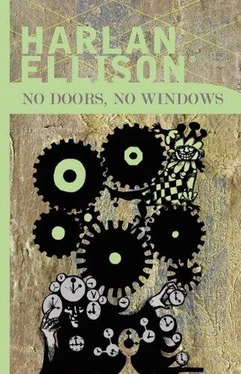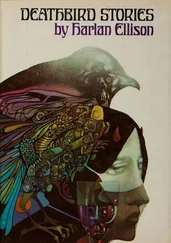That is the condition of existence under which we sustain ourselves in this country, tied umbilically to our police. I’m not fool enough to lay it entirely on the police, the crushing responsibility for this fog of uneasiness through which we feel our way, always on edge, always angry, more than a little mad. Police are just postal people, milkmen, sanitation workers. They are employees of city, state and federal government. Only a lunatic would shoot down a mailman. But they are something else. They are representatives of the System. They are the visible fist at the end of the long arm of government, the status quo, order, the establishment need to keep waves from being made. And in an era when big business, the corporate giants, the megalopolitan conglomerates serve their own ends much more ruthlessly than ever they served the needs of the people they no longer even think of as consumers (we are now only “economic purchasing units”), the police find themselves — reluctantly in many cases I’m sure — cast in the roles of thugs, strike breakers, assassins and harassers for the extruders of plastic, the smelters of ore, the manufacturers of aerosol sprays, the foreclosers and the short-sellers.
Police represent (and in many cases cannot seem to get straight in their heads) not justice, but retribution. Those who were in the dissent movement in the Sixties and early Seventies understand that terrifying fact. They still cling to the naive belief that they work for the Law and the Order, and here in Los Angeles the black-and-whites bear a colophon that reads, “To serve and protect,” yet they no longer assume responsibility (as beat cops used to do) for averting rancor between antagonistic neighbors, for helping drunks out of the gutters to “sleep it off” in a cell till they can be taken home tomorrow, for dealing sympathetically with a woman who has been raped, without asking, “Did you like it?” or “What did you do to encourage him?”
Yes, there are cops like the man who sent that letter you’ve just read, but dig the tone of submerged guilt and misery in that poor guy’s letter. He knows. And why should a man obviously sincerely dedicated to making the world just a tiny bit better, have to feel such pain? Why should he have such a hard time doing the job of easing the anguishes of everyday life for the people he meets? Why do we suddenly totemize and revere the snipers of the S.W.A.T. teams?
The complexity of the problem is staggering. In trying to do a television script for NBC on the uses of psychiatry in prisons, I found myself being drawn off into one convoluted area after another. It isn’t possible to just point the finger at the cops, or the CIA, or Nixon, or the Military-Industrial Complex and heave a sigh of relief. The fear is omnipresent. And it comes from a realization that we are the villains. And even that’s too easy a platitude. I wrote in the introduction to one of my books that they are the Bad Guys: the ones who throw Dr. Pepper cans in the bushes; the ones who get their back bumper tapped at a stop light and scream whiplash; the ones who hate all kids, or all adults, or all blacks, or all whites, or all rich, or all poor; the ones who won’t come to the aid of someone screaming in an alley; the ones who are “only doing their job” and can’t break or bend the pointless rules. They are the Bad Guys.
And I must have received a thousand letters telling me I had no right to wash my hands of the human race; I had no right to say fuck’m and stop fighting for “the cause” (whatever the hell that is); I had no right to point the finger at them and exclude myself.
Clearly, my readers did not understand the message. As the old Midwestern saying goes, “When you point a finger at someone else, you point three at yourself.” I agree. I’m one of them, so are you. We’re all the villains, the Bad Guys, the fear-makers. That part in each of us, even the noblest and most self-sacrificing of us, that forgets or fears or avoids or rationalizes and permits evil to flourish. We are all Jekyll and Hyde. And I wrote that introduction to say that we are permitting Mr. Hyde to dominate us more and more each day. Just like cops. Just like preachers. Just like humanitarians and school kids and politicians. How can you fight the fight against that evil, except in yourself?
Yes, I have the right to become a misanthrope, to decide the human race doesn’t have the stuff to make it, that it won’t last one-thousandth the life-span of the great saurians, because seemingly the human race doesn’t give a damn. And one fights only as long as one has the fiber strong enough to fight; after which, one tries to simply get through the days. And no, I haven’t really given it all up, as the writing of this introduction shows, because I’ve never learned (like Ross Macdonald’s Lew Archer) to “give it up and quit gracefully.”
But what is one to say in the face of a letter like the one from that cop? Can we possibly beat the Hyde in each of us and defeat the fear that gags us like an evil fog?
Perhaps. But probably not. We seem determined to go on this way till we either reduce ourselves to barbarians or make “civilized” existence so unbearable that crime and the suicide rate claim us before we taste the simplest joys.
I don’t have the answers for anyone but myself.
Perhaps you have some of the answers.
If so, apply them.
And then, perhaps, one day soon, guys like that cop will be able to sign their names to letters as potent and meaningful as the one you just read.
Religion won’t get it, dope won’t get it, letting Congress do it won’t get it, only caring and education will do it.
Or, as Louis Pasteur put it, “Chance favors the prepared mind.”
I’ve gone on too long. Conversation, the rap, still holds top spot in my catalogue of ways to have a good time. But I’ve rambled and digressed, and I’ve got to tell you a few things about how some of these stories came to be written, and then I’ll get my face out of your way and let you go on to read the entertainments. Excuse me if I lecture. I don’t mean to. It just comes over me sometimes.
In the main, most of these stories were written in the early and mid years of my writing career. I went through about 300,000 words of previously published (but never collected) stories to select these sixteen. I like each one of them, or they wouldn’t be here. But I’ve substantially rewritten all of them. The errors of style and grammar I made when I was learning my craft were so silly and awful, I couldn’t bear to let them stand. So in many ways these are new stories. Two were written for this book, just a few months before you bought the book.
Only one of these stories has ever appeared in a collection before, “The Whimper of Whipped Dogs.” I include it here, even though it’s available in the recently-published DEATHBIRD STORIES, because it is the most prominent of my suspense stories, and comes with the cachet of the MWA award I mentioned earlier in this introduction. Besides, it’s only 8000 words long, out of a total wordage in this book of almost 77,500. (This introduction is over 12,200 words long, a major chunk of work, as essay material intended for collections goes; or merely another example of The Mouth That Doth Run Off. Who knows …?) As a matter of fact, it occurs to me that some of you may be curious as to the way word-lengths are computed, and how a sufficiency of material is gathered together for a collection. Well, most paperbacks contain about 60,000 words, if they’re original novels of ordinary length, or collections of stories. So you’re getting quite a package for your money. Using typewriter margins set at 12 on the left and 73 on the right (good margins are necessary for the eyesight and sanity of editors, proofreaders, typesetters and even authors correcting dumb mistakes they made when they were in their twenties), using pica type — elite is too small — most writers average out between 250 to 300 words a typewritten page. I use 260 as a figure to even things out where there are stories with a lot of dialogue, which takes up less space. So that means a twelve-page story (typed, that is) will. run 3000 words. Sixteen pages is a 4000 worder. And so on. The accepted categories of story lengths are: short story — anything under 7500 words; novelette — at least 7500 but less than 17,500 words; novella — from 17,500 to 40,000; novel — anything of 40,000 words or higher. These are the generally accepted length and category judgments, as adhered to by, for instance, the Science Fiction Writers of America when classifying stories for the Nebula Awards.
Читать дальше












